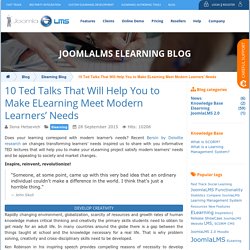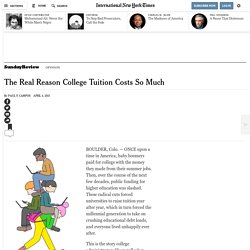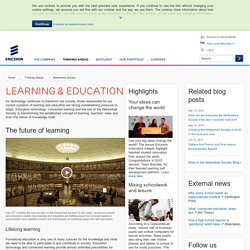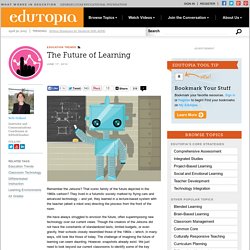

Wintergatan's 'Marble Machine' makes music with 2,000 marbles. Michael Rundle Editor, Wired.co.uk The internet is no stranger to ridiculously complex attempts to make music with technology.

But this might be one of the most purely spectacular attempts yet to take something which is now incredibly easy, and make it virtually impossible to comprehend. The Wintergartan Marble Machine, built by Swedish musician Martin Molin and filmed by Hannes Knutsson, is a hand-made music box that powers a kick drum, bass, vibraphone and other instruments using a hand crank and 2,000 marbles. The machine has to be seen to be appreciated: with dozens of beautifully carved wooden parts, tracks, pulleys and funnels for collecting and rerouting spent marbles, it's a true work of art.
A full making-of can be seen on the Wintergartan YouTube page, having apparently begun in Autumn 2014. Lms evolution or extinction. 10 Ted Talks That Will Help You to Make ELearning Meet Modern Learners’ Needs. Does your learning correspond with modern learner’s needs?

Recent Bersin by Deloitte research on changes transforming learners’ needs inspired us to share with you informative TED lectures that will help you to make your eLearning project satisfy modern learners’ needs and be appealing to society and market changes. Inspire, reinvent, revolutionize! "Someone, at some point, came up with this very bad idea that an ordinary individual couldn't make a difference in the world. I think that's just a horrible thing. " John Skoll Develop Creativity Rapidly changing environment, globalization, scarcity of resources and growth rates of human knowledge makes critical thinking and creativity the primary skills students need to obtain to get ready for an adult life.
The world's most spoken languages and where they are spoken. Coding Class, Then Naptime: Computer Science For The Kindergarten Set. Browse TED Talks. Andrew McAfee: What will future jobs look like? 8 Jobs That Will Go Extinct by 2030. #SimplicityPays: Global Brand Simplicity Index 2014. Google for Education. Class Of 2025: OPB Follows Earl Boyles Students . News. The Real Reason College Tuition Costs So Much. Photo BOULDER, Colo. — ONCE upon a time in America, baby boomers paid for college with the money they made from their summer jobs.

Then, over the course of the next few decades, public funding for higher education was slashed. These radical cuts forced universities to raise tuition year after year, which in turn forced the millennial generation to take on crushing educational debt loads, and everyone lived unhappily ever after. This is the story college administrators like to tell when they’re asked to explain why, over the past 35 years, college tuition at public universities has nearly quadrupled, to $9,139 in 2014 dollars. It is a fairy tale in the worst sense, in that it is not merely false, but rather almost the inverse of the truth. The conventional wisdom was reflected in a recent National Public Radio series on the cost of college. Some of this increased spending in education has been driven by a sharp rise in the percentage of Americans who go to college. What We Got Wrong About Books.
It is one of the cruel truisms of the book business that publishers rarely have much insight into how their products are actually used.

This is not for lack of curiosity on a publisher’s part but because of the structure of the industry: books are almost never sold directly to end-users. They are sold to libraries and the wholesalers that service libraries; they are sold to your local bookshop; and they are sold to online vendors; but rarely is a book sold directly by a publisher to the person who reads it. (For a report on those exceptional D2C situations, click here.) Book publishing, in other words, is a game of intermediaries. Sitting upstream, publishers have little insight into what is happening downstream.
This topic came to light with amusing effect a few months ago when Kobo, an international ebook retailer, began to release some information about how their readers actually read books. 2020-Forecast.pdf. The Future of Thinking. Learning and Education. As technology continues to transform our society, those responsible for our current systems of learning and education are facing overwhelming pressure to adapt.

Education technology, connected learning and the rise of the Networked Society is transforming the established concept of learning, teachers’ roles and even the nature of knowledge itself. Can ICT redefine the way we learn in the Networked Society? In this video, renowned experts and educators explain how learning and education are shifting away from a model based on memorization and repetition toward one that focuses on individual needs and self-expression. Lifelong learning Formalized education is only one of many sources for the knowledge and skills we need to be able to participate in and contribute in society. Future schools Progressive schools are already exploring the revolutionary possibilities that education technology offers. Sugata Mitra: Build a School in the Cloud.
What’s Our Vision for the Future of Learning? The Future of Learning. Remember the Jetsons?

That iconic family of the future depicted in the 1960s cartoon? They lived in a futuristic society marked by flying cars and advanced technology -- and yet, they learned in a lecture-based system with the teacher (albeit a robot one) directing the process from the front of the room.